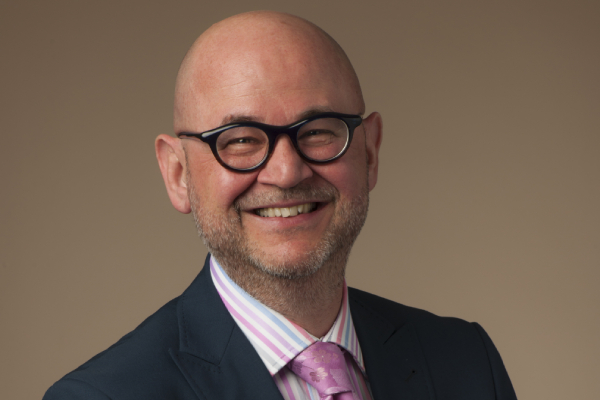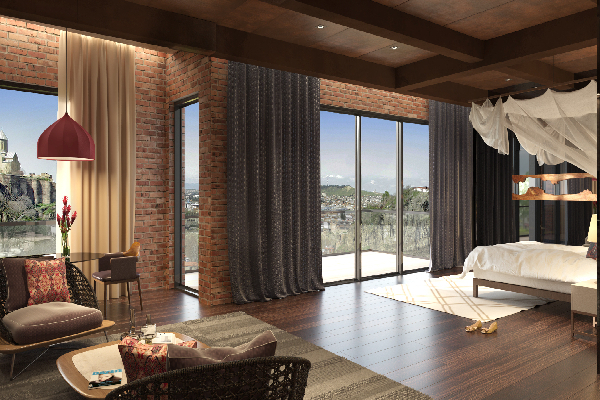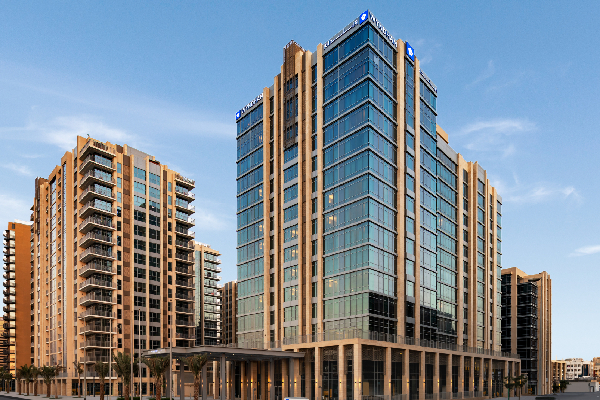For Dimitris Manikis, president of EMEA for giant Wyndham Hotels & Resorts, the past 18 months have been one of the greatest learning phases of his life. For someone who claims to travel 220 days in a year, the pandemic forced him to stay at home for 18 months, taking him away from what his job has always served up. “That’s what we do in our business. But suddenly I couldn’t travel for 18 months,” he told HOTELS from Berlin while attending the International Hospitality Investment Forum. “This was my first trip in so many months and I looked at my suitcase and didn’t know what to pack.”
The veteran hotelier, who is in charge of the development of all of Wyndham’s brands in the EMEA region and maximizing their performance, said the pandemic helped the company focus on their employees during the trying time. It also allowed them to focus on systems, and Manikis said those initiatives during COVID allowed them to achieve in 18 months what would usually take five years.
In fact, on Tuesday Wyndham announced it will add 12 properties in European resort destinations, including Spain, Canary Islands, Turkey, UK, and Austria, under a deal made with independent European resort operator CLC World Resorts & Hotels. The deal expands Wyndham’s portfolio of more than 300 hotels across Europe.
HOTELS asked Manikis to go into greater detail about Wyndham’s plan for the region, how he is working with owners to manage through and more.

HOTELS: How many projects do you have in the pipeline?
Dimitris Manikis: We have a lot of great things going on for the EMEA region. First of all, we see certain markets rebounding. We see a great interest in Russia and CIS (Commonwealth of Independent States). These are two regions that are performing extremely well from a pipeline perspective. We had a lot of success in Turkey, where we are the number one international brand. Among the 80 hotels, 58 are Ramadas, and the Turkish pipeline continues to grow. We are starting to see a leisure pipeline in Spain, Portugal, Greece and Cyprus. It’s interesting to see that our Ramada brands are the most popular brand in the EMEA region.
About 50% of our hotels in EMEA are Ramadas of different tiers. We also have a beautiful Wyndham Grand Crete Mirabello Bay on the island of Crete. Just a few months back, we launched the Wyndham Grand Algarve in Portugal. So, there is quite a lot of interest for branded hotels in leisure destinations, which is a very interesting trend. We hope that it will continue because leisure destinations seem to be rebounding first.
The other interesting thing is the launch of our La Quinta brand, which for us was a priority to launch outside of North America. We also launched our first Days Inn in Turkey, bringing the most popular economy brand of the U.S. into a European market. And, we continue our growth of our Super 8 brand. In Germany, we have already launched 10 Super 8s.
Overall, it’s a strong pipeline with a lot of interest in some key Wyndham brands, and a few surprises in terms of market that are suddenly picking up faster than others. We are number one in Georgia and Turkey, growing strongly in Romania and Greece. It’s an interesting mix.
I’m also very proud of our development in India, where our pipeline continues despite the humanitarian crisis. People continue to travel and write deals as the interest of the Indian hoteliers for international brands never stopped.
Pakistan has been one of our fastest growing markets in that area. The pipeline and business never stopped, which shows the resilience of our industry.
H: Any management deals?
DM: Yes, there are more in the Middle East and especially the U.A.E. We have at least three or four in the pipeline right now.
H: Considering it’s such a unique, unprecedented moment, how are you getting deals across the finish line?
DM: We have made serious sacrifices in terms of concessions, as we realized as early as April 2020 that there is no franchise business without franchisees. Number one is survival of franchisees. Then, we didn’t call them to ask them to pay; we called them to say we’re here for them and they could count on us if they needed anything. That word-of-mouth helped us get a lot of new deals.
The success of my team on the development side is doubled when existing clients bring us new deals because that means they trust Wyndham.
We have sold the value proposition and opened in markets we were hesitant to go to before. This is why the Russian and CIS pipelines are growing. So, now we have created a new formula to grow the business.

H: Are you exploring some of the new markets out of necessity?
DM: It wasn’t a necessity but it was an eye opener. For instance, China is working on the One Belt One Road initiative. There are several countries, like Kazakhstan and Uzbekistan, developing infrastructure, railways, roads and new hotels to satisfy this expansion. The growth is crazy and so many new things are happening. The other interesting point is how politically stable some of these markets are, which creates new places for us to put flags. All these things helped us create a pipeline that’s diverse and also very dynamic.
H: In your more traditional markets, do pipeline owners consist of your repeat customers?
DM: Yes, a lot of repeat customers. We have people referring us new deals. At the same time, we’ve signed a couple non-exclusive development agreements with key players and asked them for help to develop certain brands in some areas. For example, we did a deal in Spain with Smy Hotels, a non-exclusive development agreement that said for 10 years we will expand with 20 hotels in Spain, Portugal, Italy and Greece. Strategic alliances and relationships with key players will carry forward the growth and help us a lot.
H: Is there anything that you’ve instituted that’s been particularly noteworthy to help owners through COVID?
DM: The hybrid meeting model we started in Europe helped, especially in the first months of the pandemic. It meant you could actually hold the meeting with 10, or 15, or 50 physical participants, and another 500 on a hybrid environment.
The other thing that that we did was the Easy Book. A lot of infrastructure projects continued, and people continued to travel. We brought these people close to our owners and started generating business that way. That was a real game changer for us.
H: How are you helping your owners manage the labor challenge?
DM: I just came from a meeting with one of our biggest German owners. He said he has senior people resigning, people leaving to go to other industries and people not returning to work because they are comfortably paid by the government. This support from the government is a double-edged sword for hospitality. Some people stayed comfortably at home being paid.
How can we make hospitality interesting again? We just launched an engagement tool and said, what do the general managers in the head of departments need? They don’t need to just throw a 10% salary increase, right? They need more. How do we make them learn how to engage with their staff? How do you add training modules that make their lives more interesting? How do you bring a bit more spice into their work lives with training, engagement tools, giving them diplomas and certificates on certain training modules?
The initial feedback was fantastic, teaching owners how to engage closer and more with staff. If you ask me, just the pay raise doesn’t cut it anymore.

H: How are you working with your teams differently?
DM: In the past, we never had appreciation or wellbeing days or wellbeing exercises. We’ve done more webinars on wellbeing than we’ve done in the past. In the past, we never had a webinar where I sat in a room and talked about mental health and psychological support. Not that people necessarily needed it. But at the same time, we wanted to ensure that somebody who is cramped in a small apartment in, say, London, with another three roommates and working from home for nine to five is getting our support.
H: Do you think we’ll revert to the old norms of business? Is it changed for good?
DM: I don’t believe we’re going to be the same anymore. If we believe we’re going to be the same, we’re missing the 18 months of hard-core lessons in sustainability, a better planet, travel not to accumulate more air miles, but travel because it means something.
H: What’s your biggest opportunity and challenge?
DM: My biggest challenge is to keep up with the pace of change, while at the same time focus on business principles and values.
My biggest opportunity is everything we learned in the last 18 months. It has made us a better company, built a better future and made the team more resilient and focused in a face-to-face world.
We’re going back to our offices in October and it’s going to be strange. How do we keep up the same pace? If my team and company is in good shape, and we are focused on our values and what we need to achieve, then the opportunities are endless. A lot depends on us. That, for me, is the biggest opportunity.
H: What are you passionate about?
DM: I’m passionate about the new generation and diversity in hospitality. Wyndham is doing an enormous amount of work to get women and diverse cultures into hospitality. We need to bring in new talent while retaining the existing ones. That, for me, is the foundation of the future of hospitality. We need to make hospitality an interesting industry for people to work in.

